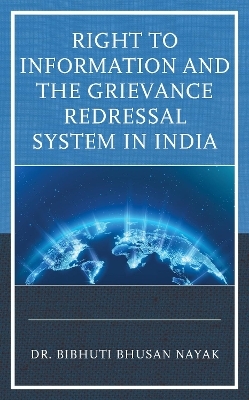
Right to Information and the Grievance Redressal System in India
Seiten
2023
Lexington Books/Fortress Academic (Verlag)
978-1-6669-2564-7 (ISBN)
Lexington Books/Fortress Academic (Verlag)
978-1-6669-2564-7 (ISBN)
This book rejects the fundamental ideas of hidden administrative practices and helps the policy maker to strengthen the right to information Act in India. Finally this book is an attempt to ensure accountability and how the grievance redressal mechanism related to work culture in India.
The book critically examines the practice of Right to Information Act and employee’s grievance redressal system in India. This book initiates the debate on whether the Act leads to an actual redressal of grievances or is it merely an attempt to gather innocuous information which may not have further use. It questions whether the absence of an in-built redressal mechanism defeats the core purpose with which the Act was promoted. The numerous debates and controversies have continued to surface after the implementation of the Act. Many frictions were created between the affected parties i.e. the government, bureaucracy, judiciary etc. on one hand and the general public on the other hand. Instead of reducing the burden on the judicial system of India, the Act has resulted in increasing the cases related to denial of information from public offices that have reached the courts of law. It has led to an additional burden on bureaucracy which is already crumbling under pressure. Finally, the book argues for public accountability in India and the Odisha state.
The book critically examines the practice of Right to Information Act and employee’s grievance redressal system in India. This book initiates the debate on whether the Act leads to an actual redressal of grievances or is it merely an attempt to gather innocuous information which may not have further use. It questions whether the absence of an in-built redressal mechanism defeats the core purpose with which the Act was promoted. The numerous debates and controversies have continued to surface after the implementation of the Act. Many frictions were created between the affected parties i.e. the government, bureaucracy, judiciary etc. on one hand and the general public on the other hand. Instead of reducing the burden on the judicial system of India, the Act has resulted in increasing the cases related to denial of information from public offices that have reached the courts of law. It has led to an additional burden on bureaucracy which is already crumbling under pressure. Finally, the book argues for public accountability in India and the Odisha state.
Dr Bibhuti Bhusan Nayak is political scientist and former ICSSR Doctoral fellow at Department of Public Administration, Utkal University, Odisha, India.
List of Figures
List of Tables
Acknowledgements
Introduction
Chapter 1: Right to Information and Public Accountability
Chapter 2: Theories of Right to Information in India
Chapter 3: Global Trajectory and Legal Framework of Right to Information
Chapter 4: Functioning of Right to Information Act in Odisha Secretariat
Chapter 5: Grievance Redressal and RTI: Secretariat Employee’s Perspective
Conclusion
Appendix A: Text
Appendix B: Table
Appendix C: Figure
Bibliography
About the Author
| Erscheinungsdatum | 31.01.2023 |
|---|---|
| Sprache | englisch |
| Maße | 158 x 237 mm |
| Gewicht | 581 g |
| Themenwelt | Geisteswissenschaften ► Geschichte ► Regional- / Ländergeschichte |
| Geschichte ► Teilgebiete der Geschichte ► Militärgeschichte | |
| Recht / Steuern ► EU / Internationales Recht | |
| Recht / Steuern ► Öffentliches Recht | |
| Recht / Steuern ► Rechtsgeschichte | |
| Sozialwissenschaften ► Politik / Verwaltung | |
| ISBN-10 | 1-6669-2564-0 / 1666925640 |
| ISBN-13 | 978-1-6669-2564-7 / 9781666925647 |
| Zustand | Neuware |
| Haben Sie eine Frage zum Produkt? |
Mehr entdecken
aus dem Bereich
aus dem Bereich
neueste Manipulationstechniken als Waffengattung der NATO
Buch | Softcover (2023)
Westend (Verlag)
CHF 33,55
Deutschlands Schwäche in der Zeitenwende
Buch | Softcover (2023)
C.H.Beck (Verlag)
CHF 25,20


